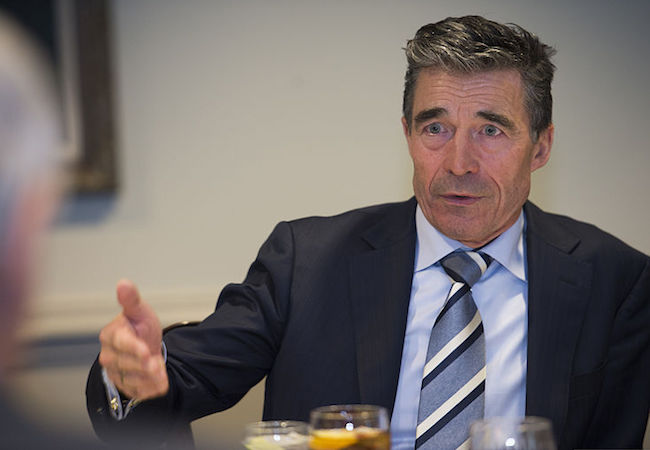
By Raphael Benaroya
During a recent visit in Warsaw, I had the privilege of accompanying the U.S. Ambassador to Poland, Georgette Mosbacher to the Warsaw Security Forum. The highlight of this event under the patronage of NATO and the European Commission was the presentation of the Knight of Freedom Award.
The award recognizes individuals who exemplify the ideals of freedom, justice, and democracy and honors the memory of Casimir Pulaski, the Poland-born 18th century hero of the American Revolution and the father of the US Cavalry.
This year’s recipient was Anders Fogh Rasmussen, the former Prime Minister of Denmark and Secretary-General of NATO. Mr. Rasmussen has been a strong U.S. ally in the past; in 2003, under his leadership, Denmark was one of only four countries to actively support the U.S. on the ground in the Iraq War (along with the U.K., Poland and Australia).
So I was surprised to hear Mr. Rasmussen’s harsh—and inaccurate—judgment on the United States.
“Geopolitically, the world is on fire, and the reason is clear: we are missing the global policeman,” he said in his speech accepting the award. “Since World War II, America has acted as the guardian of a rules-based world order. But now, the United States seems to prefer retirement.”
Specifically, he said Russia’s interference in Western democracies and China’s aggressive assertion of power through economic levers and trade abuses had met with inadequate responses from the U.S.
In response, Ambassador Mosbacher veered from her prepared remarks to deliver a spirited defense of U.S. actions to promote European security in both world wars and since. “America has never retired,” she fired off. And I quite agree. Indeed, the U.S. continues to devote considerable resources to European security and has reaffirmed its commitment to Article 5 of the Washington Treaty, which obligates NATO members to consider an attack against one to be an attack against all. But consider the American taxpayer’s point of view. Each NATO member is required to contribute 2% of its gross domestic product toward military security. U.S. defense spending—over $685 billion in 2017, or 3.6% of our GDP—dwarfs that of other members. Only four of our NATO allies—the United Kingdom, Poland, Greece and Estonia—have met or exceeded the 2% threshold.
What’s more, only two-thirds of the 28 European NATO members have realistic plans to meet their 2% commitment. The issue is not the U.S. commitment to NATO. Rather, the issue is the need for NATO members to step up and pay their fair share toward our collective security.
As for U.S. “disengagement” in the face of aggression by Russia and China, that couldn’t be further from the truth.
U.S. sanctions against Russia extend broadly across financial services, energy and defense, as chronicled by the U.S. Department of State. The U.S. strongly opposes Nord Stream 2, a divisive Russian pipeline project that will bypass East-Central Europe, pumping gas directly from Russia to Germany and increasing Europe’s reliance on Russian energy. In addition, the U.S. intelligence community, backed by both the Senate Intelligence Committee and the Trump administration, continues to investigate and fight against Russian meddling in democratic institutions around the world.
Similarly, the U.S. is applying economic pressure on China in response to its unfair trade practices. The U.S. Navy is also making its presence felt in the South China Sea to counter China’s development of artificial islands, which, according to a recent Pentagon report, could “add a nuclear element to the territorial dispute.” Furthermore, the Trump Administration recently imposed sanctions on China for purchasing Russian military equipment, and it is threatening sanctions over China’s crackdown on minority Uighur Muslims. National Security Adviser John Bolton recently blasted China and Russia for their predatory practices in Africa and unveiled strategy to counter the threat they pose there.
I do agree with Mr. Rasmussen on several points he made in his acceptance of the Knight of Freedom Award. The human condition—measured by health statistics, economic gains and the rise of democracy—has improved dramatically over the past 40 years. And the 20th century has taught us that unity and cooperation between the U.S. and Europe are essential for our continued freedom and prosperity. These truths are, in large part, a result of U.S. values and engagement with the world.
But no one can say, fairly, that the United States is “retiring” and “disengaged” from defending democracy and preserving global security—financially and militarily. The “Pax Americana” may be evolving, but is not over yet.
Raphael Benaroya is an American businessman, currently the Senior Partner of Biltmore Capital. He serves as Vice Chairman and executive committee member of Business Executives for National Security (BENS), a Washington, D.C.-based, non-partisan NGO




